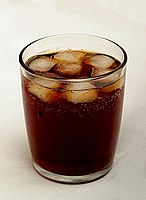
Photo from wikipedia
Oral health problems may occur as a result of the ingestion of acid drinks. The objective of this in vitro study was to quantify and screen the concentration of potassium… Click to show full abstract
Oral health problems may occur as a result of the ingestion of acid drinks. The objective of this in vitro study was to quantify and screen the concentration of potassium (K), phosphorus (P), calcium (Ca), magnesium (Mg), manganese (Mn), zinc (Zn), iron (Fe), copper (Cu), barium (Ba), lead (Pb), arsenic (As), cadmium (Cd), aluminum (Al), cobalt (Co), chromium (Cr), molybdenum (Mo), sodium (Na), nickel (Ni), selenium (Se), and vanadium (V) released from bovine incisors during an erosive challenge at different times of exposure when immersed in Coca-Cola™, orange juice, and grape juice. A total of 240 samples of bovine incisor teeth were used for the erosive challenge and allocated in groups. Digestion of drinks was performed using microwave-assisted digestion. The content in acidic drinks was monitored before and after the erosive challenge at exposure times of 1, 5, and 60 min using inductively coupled plasma optical emission spectrometry (ICP OES). The drinks’ pH varied slightly during the erosive challenge but remained below the critical value of pH 5 to cause tooth demineralization. The concentrations of elements released from the bovine incisors during the in vitro erosive challenge depend on exposure times when immersed in acidic beverages. For some elements such as Ca, Mn, Zn, Fe, Cu, Ba, Pb, As, and Cd, quantified in acidic drinks, grape juice had greater erosive potential than Coca-Cola™ and orange juice. Quantification and monitoring of chemical elements in bovine teeth can be performed considering a longer erosive time and other types of acidic drinks. Further analysis using human teeth is still not available and must be conducted. The demineralization of teeth not only occurs in acidic beverages; physical and chemical factors play other roles and should be investigated.
Journal Title: Molecules
Year Published: 2021
Link to full text (if available)
Share on Social Media: Sign Up to like & get
recommendations!